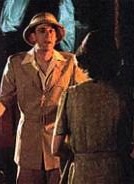Tuesday, April 2, 1985.
THE PURPLE ROSE OF CAIRO. Original music by Dick Hyman. Written and directed by Woody Allen. Running time: 82 minutes. Mature entertainment.
WOODY'S GOT RHYTHM. A musically-minded movie maker, Woody Allen regularly sits in with the New Orleans-style jazz band at Michael's, a fashionable Manhattan night spot.
He was there playing his clarinet the night that his 1977 comedy Annie Hall won the Best Picture Oscar. He was there again last week, [March 25, 1985] ignoring his original screenplay nomination for The Purple Rose of Cairo (as did the Academy members, who gave the prize to Places in the Heart writer/director Robert Benton).
Since 1979, Allen's feature film projects have developed their own rhythm. With remarkable regularity, it's been one on and one off.
Manhattan (1979), A Midsummer Night's Sex Comedy (1982) and Broadway Danny Rose (1984) were filler fare, undistinguished products of the Allen off-season.
By contrast, Stardust Memories (1980), Zelig (1983) and his current The Purple Rose of Cairo are all delightfully on.
In his best pictures, Allen applies his intellectually anarchic imagination to the subject of film itself. His new one carries us back to 1935, a time when the movies buoyed the spirits of an economically depressed nation.
The Purple Rose of Cairo is the name of an RKO Studios release on view at the Jewel, a small-town New Jersey movie house. A basic white-telephone romance, it features a supporting character named Tom Baxter (Jeff Daniels), a young poet-explorer "on the verge of a madcap Manhattan weekend."
Among the people taking refuge in the Jewel is Cecilia (Mia Farrow), a star-struck hash house waitress married to a faithless, occasionally violent lout descriptively named Monk (Danny Aiello). During her fifth time through the picture, the pith-helmeted Baxter turns away from his fellow characters and speaks directly to her.
Determined to follow his noble heart, Baxter steps out of the film and insists that Cecilia run off with him into the "real" world. Unable to continue the story without him, the remaining movie characters mark time by discussing the situation among themselves, and with their outraged audience.
When informed of the unprecedented occurrence, the studio bosses are suitably horrified. Actor Gil Shepherd (also Jeff Daniels) — "I worked so hard to make him real" — is dispatched to coax Baxter, his errant alter ego, back into the photoplay.
Using ideas borrowed from Warner Bros. cartoons and attitudes appropriated from the failed 1981 Herbert Ross musical Pennies From Heaven, Allen manages a magically comic exploration of the movies as a form of alternate reality. Bittersweet rather than bumptious, The Purple Rose of Cairo offers Allen at his melancholic best.
The above is a restored version of a Province review by Michael Walsh originally published in 1985. For additional information on this archived material, please visit my FAQ.
Afterword: Born in Athens, Georgia, but raised in Chelsea, Michigan, Jeff Daniels has authentic Middle American roots, ones often reflected in his nuanced, generally likeable performances. After establishing himself on the New York stage, he made his big screen breakthrough in his third feature, The Purple Rose of Cairo. His dual role — playing screen character Tom Baxter and movie actor Gil Shepherd — foreshadowed the kind of balanced career that he's enjoyed. For example, when Woody Allen asked him to appear in 1987's Radio Days, it was to play the studio actor who is the voice of an Axis-battling hero called Biff Baxter. Years later, director George Clooney cast the mature Daniels as Sig Mickelson, the 1950s executive who ran CBS News, in the broadcast history drama Good Night, and Good Luck (2005). His appearance as a real-life figure found its balance in reel-life character Will McAvoy, the cable news anchorman that Daniels played for three seasons in HBO's The Newsroom (2012-2014). In October 2015, filmgoers saw him as John Sculley, the real-life Apple CEO at odds with the title character in Steve Jobs. That same month, he was on screen as tech-savvy executive Teddy Sanders, a fictional NASA director who risks all to rescue a lost astronaut in The Martian (2015).
Overall, Daniels built his career on powerful supporting roles, including that of Bill Johnson, the quiet diner owner who has his inner artist awakened in 1988's Pleasantville. He traded quips with Keanu Reeves in 1994's Speed, and took up the challenge of co-starring with Jim Carrey in the Dumb & Dumber movies (1994; 2014). On location in Vancouver, Daniels was part of the ensemble in the afterlife fantasy Five People You Meet in Heaven (2004), playing the Blue Man who is the principal character's heavenly guide. A year later he was back in B.C., co-starring in the Robin Williams road trip comedy RV.
His film work notwithstanding, Daniels remains committed to live theatre. In 1991, he founded the Purple Rose Theatre Company in his Michigan hometown. Its resident company produces four shows a year and develops new works with midwestern themes. Currently, he is on Broadway, starring in a new production of Blackbird, a dark 2005 drama about a sex offender confronted by his now-adult victim. Jeff Daniels turns 61 today (February 19).
